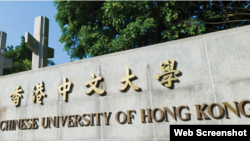A report released on Wednesday finds that Hong Kong's national security law, enacted in July 2020, has eroded academic freedom in the former British colony.
The report, co-authored by Human Rights Watch, and the Washington-based advocacy organization Hong Kong Democracy Council, said university authorities have imposed greater control and limitations on student activities and that students and faculty members are increasingly exercising self-censorship to avoid getting into trouble.
"Students, academics, and administrators, especially those from Hong Kong studying contemporary socio-political issues, feel as if they are living under a microscope," the report says.
Some analysts say the opaque definition of what constitutes a violation of the security law has created a chilling effect among students and faculty members at Hong Kong universities.
"When the red line isn't clear, there will be a pervasive sense of fear, and students and faculty members will try to make adjustments to ensure they don't get into trouble," Maya Wang, the associate China director at Human Rights Watch, told VOA by phone.
The report said Hong Kong's eight public universities have been managed by people who hold views favored by Beijing following the imposition of the law in 2020. Since then, university officials have increased crackdowns on student unions and banned symbols or events viewed as promoting pro-democracy values.
"University officials have punished students for holding peaceful protests and gatherings, and have broadly censored student publications, communications, and events," the report reads.
Wang at Human Rights Watch said since many college students and academics were involved in 2019 protests over an extradition bill, one of the Chinese government's priorities following the implementation of the law is to "impose ideological control" over universities.
"The decline of academic freedom in Hong Kong's universities is part of Beijing's attempt to impose ideological control over the entire city," she told VOA.
Exercising self-censorship
Most of the 33 students and academics interviewed for the report said self-censorship is a common practice at universities in Hong Kong, especially on socio-political topics related to China and Hong Kong.
"They do this when expressing themselves in classrooms, when writing and researching academic articles, and when inviting speakers for academic conferences," the report says, adding that academics teaching Hong Kong and China current affairs feel "especially vulnerable."
In some cases, university officials have asked academics in the social science field to stop offering courses on topics that Beijing considers sensitive. Others face censorship imposed by university administrators or academic publishers.
Some academics said the prevalence of self-censorship at universities in Hong Kong will reduce international understanding of the dynamics in China.
"Hong Kong was always an important space that gives the international community some insight into what's happening in Hong Kong and the broader China, but that space is now rapidly disappearing," Lokman Tsui, a research fellow at the University of Toronto's Citizen Lab and a former journalism professor at the Chinese University of Hong Kong, told VOA by phone.
The law's negative impact on academic freedom in Hong Kong seems to differ between academics in different fields. "Some said [the NSL] affected everything they do; others said it has very little impact," the report says.
Since university management is stacked with supporters of the Chinese government's position, the report says university administrators have worked with Chinese and Hong Kong authorities to harass, intimidate or even remove academics voicing different opinions.
"The government does that by defaming and intimidating those academics perceived to hold liberal or pro-democracy views in the state-owned media and denying or not issuing visas to foreign academics expressing such opinions," the report says, adding that universities would then fire, let go or deny tenure to these academics.
Human Rights Watch and Hong Kong Democracy Council said the Chinese government's efforts to "cleanse" universities in Hong Kong have led to a "harmonization" of opinion in academia in Hong Kong. They also help amplify Chinese and Hong Kong authorities' claim that pro-democracy voices are now "in the minority."
"The Chinese government's overall intention has been to 'cleanse' the universities [and] the result is a sanitized version of higher education compliant with the Party's views, which so far continues to deliver a high-caliber education," the report says.
Tsui at Citizen Lab said since Hong Kong passed a separate national security law called Article 23 in March, Hong Kong authorities will likely continue the crackdown on academic freedom.
"In addition to the criminalization of speech, the authorities are also targeting foreign funding of academic research, so they haven't emptied the glass yet," he told VOA.
VOA contacted the Hong Kong government for comment but did not receive a reply by the deadline.
However, in October 2023, Hong Kong Chief Executive John Lee said in a social media post that Hong Kong's excellent education infrastructure, world-renowned universities, and talented researchers were all key to turning the city into "an international hub for post-secondary education."
In the social media post, Lee vowed to study how to utilize the "unique status and advantages of the One Country, Two Systems" to attract the best talents from all over the world to Hong Kong.
Since some universities in Hong Kong have a large number of joint research projects and exchange programs with universities abroad, Human Rights Watch’s Wang said foreign universities should be aware of the repression that is taking place at universities in Hong Kong, while trying to provide support for Hong Kong students and academics being targeted by the Chinese and Hong Kong authorities.
"Foreign universities should avoid elevating the repressive actors and provide scholarships or fellowships to endangered Hong Kong students and academics to ensure they could continue to do their research outside of Hong Kong without fear," she said.




